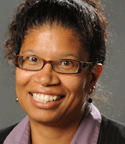It's Time to Talk Essay on Race: Adaora Nzelibe Schmiedl
Adaora Nzelibe Schmiedl, Director of Development and Marketing for Towards Employment, responds to the question, “Why is an open and honest discussion about race important to you and your community?” in the following essay, which was one of two winners in a contest sponsored by Fresh Water and the YWCA Greater Cleveland as part of that organization's second annual It’s Time to Talk Forum on Race event.
 Adaora Nzelibe SchmiedI belong to a community of light skinned girls who carry the baggage of centuries of mixed race parentage, forced and consensual.
Adaora Nzelibe SchmiedI belong to a community of light skinned girls who carry the baggage of centuries of mixed race parentage, forced and consensual.
I was born to a Nigerian father and a Polish, Scottish, Pennsylvania Dutch mother with a phizo-affective disorder in these United States. My parents were not enraged when the minister would not read marriage banns. In the Church of England “banns are an announcement in church of your intention to marry … read out every week in churches across the land for millions of couples, over many centuries.” He asked them and their guests to come in the back door for the service. Their wedding picture was posed by the back door.
Speaking about back doors, I hovered just outside of conversational norms with two cultures, a mother who saw visions, always aware that at least one parent, no matter where we lived, was “foreign.” But talking about the color of my skin was a bigger conversation stopper.
I asked teachers at the Nannie Helen Burroughs Elementary School in Washington DC why there were so many descriptions for Caucasian skin - olive, almond, milky white - I actually made a list. With hours spent listening to peers dissect tonality of brown skin (I was “light skinned but not light enough to pass”), I was puzzled. In the books we read, people of African descent were just black. None of my teachers had an answer – even though I pointed out that each teacher was several shades lighter than me, with different underlying rich tints. Their skin could hardly be described in one word.
Learning to balance when I was “just black” as opposed to “light skinned black,” I took down pictures in my dorm room and apartment to avoid awkward “what exactly are you?” questions. Better to be “just black.” Finding dates, making friends and fitting in was easier. I could also more easily represent the whole race in classroom conversations and work place conundrums.
Now I have pictures in my office. I refuse to represent every black experience but own my experience, often echoed back to me by other women. My children have very light skin and blue eyes. When I enter a public playground, I do a loud third person Mama Call: “Mama will be right here if you need her.” At soccer practice last October in Cleveland Heights, a man told me, after I finished comforting my wailing 10 year old, “that I might want to look for his mother.” I’m not the only one who has a Mama Call.
I talk to my children about identity. They are proud of their heritage, which includes their African descent. They are already pushed aside in conversations because they are “too light to be black.”
As I become a light skinned elder, I say it’s time for the continuum of conversations to acknowledge actual skin color and heritage that feed the American experience. If we make our children choose to be one thing, we all lose.
